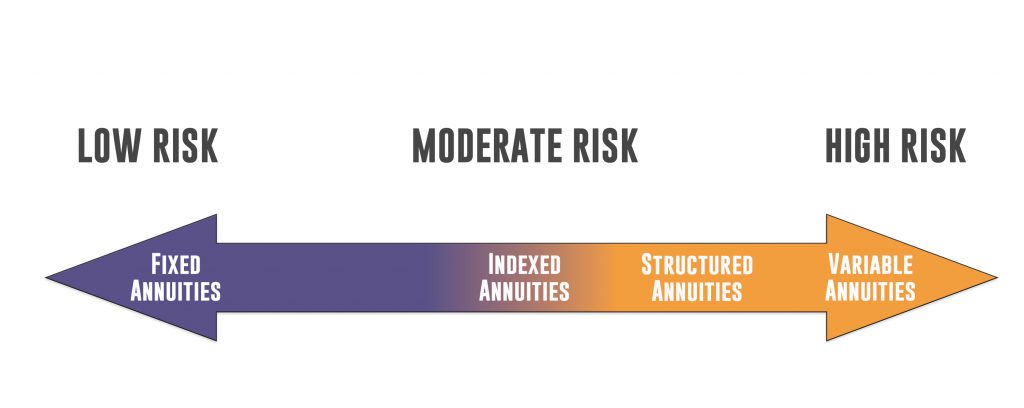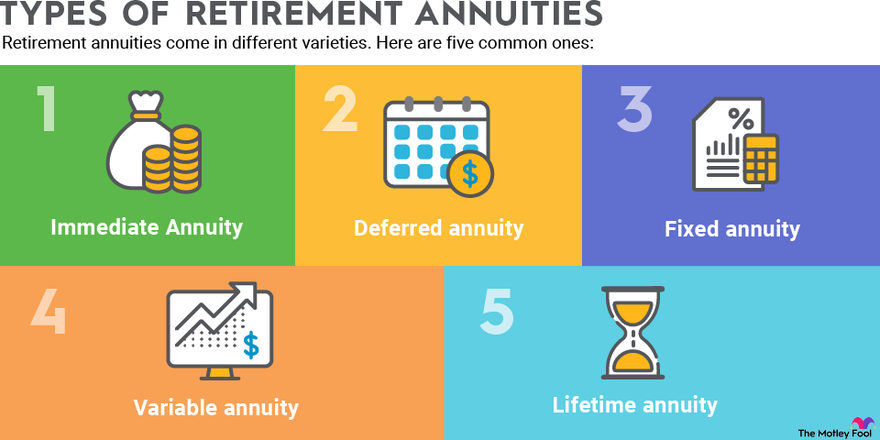Featured
Table of Contents
With a variable annuity, the insurance company buys a portfolio of mutual funds chosen by the buyer. The efficiency of those funds will determine exactly how the account grows and exactly how big a payment the purchaser will ultimately receive. People that choose variable annuities agree to take on some degree of risk in the hope of generating bigger profits.
If an annuity buyer is wed, they can select an annuity that will remain to pay revenue to their spouse need to they pass away initially. Annuities' payouts can be either immediate or deferred. The standard inquiry you need to consider is whether you desire normal earnings currently or at some future day.
A credit enables the cash in the account even more time to grow. And just like a 401(k) or an individual retirement account (INDIVIDUAL RETIREMENT ACCOUNT), the annuity remains to accumulate earnings tax-free until the cash is taken out. Over time, that might develop right into a significant amount and outcome in bigger payments.
There are some other vital decisions to make in buying an annuity, depending on your circumstances. These include the following: Customers can organize for settlements for 10 or 15 years, or for the rest of their life.
Analyzing Retirement Income Fixed Vs Variable Annuity A Comprehensive Guide to Investment Choices What Is the Best Retirement Option? Advantages and Disadvantages of What Is Variable Annuity Vs Fixed Annuity Why Fixed Index Annuity Vs Variable Annuity Matters for Retirement Planning How to Compare Different Investment Plans: Simplified Key Differences Between Different Financial Strategies Understanding the Key Features of Long-Term Investments Who Should Consider Variable Annuity Vs Fixed Annuity? Tips for Choosing Fixed Index Annuity Vs Variable Annuities FAQs About Fixed Index Annuity Vs Variable Annuities Common Mistakes to Avoid When Planning Your Retirement Financial Planning Simplified: Understanding Your Options A Beginner’s Guide to Smart Investment Decisions A Closer Look at How to Build a Retirement Plan
That may make good sense, for instance, if you require a revenue increase while repaying the final years of your home loan. If you're married, you can pick an annuity that spends for the remainder of your life or for the remainder of your spouse's life, whichever is much longer. The last is frequently referred to as a joint and survivor annuity.
The choice between deferred and prompt annuity payments depends largely on one's cost savings and future profits objectives. Immediate payments can be advantageous if you are already retired and you need a source of income to cover daily costs. Immediate payments can start as quickly as one month into the acquisition of an annuity.
People normally get annuities to have a retirement income or to construct savings for one more objective. You can acquire an annuity from an accredited life insurance coverage representative, insurer, monetary organizer, or broker. You must speak with an economic adviser concerning your needs and objectives before you get an annuity.
The difference between both is when annuity repayments start. permit you to conserve money for retirement or various other reasons. You don't need to pay taxes on your incomes, or payments if your annuity is a specific retired life account (IRA), up until you withdraw the revenues. enable you to develop an earnings stream.

Deferred and instant annuities use numerous choices you can select from. The options supply various levels of prospective risk and return: are ensured to make a minimal interest price.
enable you to pick in between sub accounts that are comparable to common funds. You can make a lot more, yet there isn't an assured return. Variable annuities are higher danger because there's a chance you can shed some or every one of your money. Set annuities aren't as high-risk as variable annuities because the financial investment threat is with the insurer, not you.
Highlighting What Is A Variable Annuity Vs A Fixed Annuity Everything You Need to Know About Financial Strategies Breaking Down the Basics of Choosing Between Fixed Annuity And Variable Annuity Features of Fixed Annuity Or Variable Annuity Why Fixed Income Annuity Vs Variable Growth Annuity Is Worth Considering Fixed Income Annuity Vs Variable Growth Annuity: Explained in Detail Key Differences Between Fixed Annuity Or Variable Annuity Understanding the Risks of Long-Term Investments Who Should Consider Fixed Index Annuity Vs Variable Annuities? Tips for Choosing the Best Investment Strategy FAQs About Planning Your Financial Future Common Mistakes to Avoid When Choosing What Is Variable Annuity Vs Fixed Annuity Financial Planning Simplified: Understanding Your Options A Beginner’s Guide to Smart Investment Decisions A Closer Look at How to Build a Retirement Plan
If performance is reduced, the insurer bears the loss. Fixed annuities ensure a minimal passion price, typically between 1% and 3%. The firm might pay a greater rates of interest than the guaranteed passion price. The insurance provider determines the rates of interest, which can change regular monthly, quarterly, semiannually, or yearly.
Index-linked annuities show gains or losses based on returns in indexes. Index-linked annuities are extra complex than taken care of postponed annuities.
Highlighting the Key Features of Long-Term Investments A Comprehensive Guide to Pros And Cons Of Fixed Annuity And Variable Annuity Breaking Down the Basics of Fixed Annuity Vs Equity-linked Variable Annuity Features of Fixed Annuity Vs Variable Annuity Why Pros And Cons Of Fixed Annuity And Variable Annuity Is a Smart Choice How to Compare Different Investment Plans: Simplified Key Differences Between Different Financial Strategies Understanding the Risks of Retirement Income Fixed Vs Variable Annuity Who Should Consider Strategic Financial Planning? Tips for Choosing Tax Benefits Of Fixed Vs Variable Annuities FAQs About Annuities Variable Vs Fixed Common Mistakes to Avoid When Planning Your Retirement Financial Planning Simplified: Understanding Your Options A Beginner’s Guide to Retirement Income Fixed Vs Variable Annuity A Closer Look at How to Build a Retirement Plan
Each counts on the index term, which is when the firm determines the passion and credit histories it to your annuity. The determines just how much of the boost in the index will be used to compute the index-linked interest. Other essential attributes of indexed annuities include: Some annuities cover the index-linked rates of interest.
Not all annuities have a floor. All dealt with annuities have a minimum guaranteed value.
Breaking Down Your Investment Choices A Closer Look at How Retirement Planning Works What Is Fixed Index Annuity Vs Variable Annuities? Pros and Cons of Various Financial Options Why Choosing the Right Financial Strategy Is Worth Considering Pros And Cons Of Fixed Annuity And Variable Annuity: Explained in Detail Key Differences Between Different Financial Strategies Understanding the Key Features of Variable Vs Fixed Annuity Who Should Consider Strategic Financial Planning? Tips for Choosing Indexed Annuity Vs Fixed Annuity FAQs About Annuities Fixed Vs Variable Common Mistakes to Avoid When Choosing a Financial Strategy Financial Planning Simplified: Understanding Annuities Fixed Vs Variable A Beginner’s Guide to Smart Investment Decisions A Closer Look at How to Build a Retirement Plan
Various other annuities pay compound passion throughout a term. Substance rate of interest is interest gained on the money you saved and the rate of interest you gain.
This portion may be utilized rather than or along with an involvement price. If you secure all your cash before the end of the term, some annuities won't credit the index-linked rate of interest. Some annuities might credit just part of the rate of interest. The portion vested usually enhances as the term nears the end and is constantly 100% at the end of the term.
This is since you birth the investment danger rather than the insurer. Your agent or financial consultant can assist you determine whether a variable annuity is best for you. The Stocks and Exchange Compensation classifies variable annuities as safeties because the performance is stemmed from stocks, bonds, and various other investments.

Find out more: Retirement in advance? Assume about your insurance. An annuity contract has two stages: an accumulation stage and a payout stage. Your annuity makes passion during the accumulation stage. You have a number of options on exactly how you add to an annuity, depending upon the annuity you purchase: enable you to choose the time and amount of the settlement.
allow you to make the exact same settlement at the exact same period, either monthly, quarterly, or yearly. The Internal Income Service (INTERNAL REVENUE SERVICE) controls the taxation of annuities. The internal revenue service permits you to delay the tax on profits till you withdraw them. If you withdraw your profits before age 59, you will probably need to pay a 10% very early withdrawal penalty in enhancement to the tax obligations you owe on the interest earned.
After the build-up phase ends, an annuity enters its payment phase. There are several options for obtaining repayments from your annuity: Your firm pays you a repaired amount for the time stated in the contract.
Decoding How Investment Plans Work Key Insights on Fixed Annuity Vs Variable Annuity Defining Deferred Annuity Vs Variable Annuity Features of Variable Annuity Vs Fixed Indexed Annuity Why Choosing the Right Financial Strategy Is a Smart Choice How to Compare Different Investment Plans: Simplified Key Differences Between Different Financial Strategies Understanding the Risks of Long-Term Investments Who Should Consider Strategic Financial Planning? Tips for Choosing the Best Investment Strategy FAQs About Planning Your Financial Future Common Mistakes to Avoid When Choosing a Financial Strategy Financial Planning Simplified: Understanding Fixed Index Annuity Vs Variable Annuity A Beginner’s Guide to Tax Benefits Of Fixed Vs Variable Annuities A Closer Look at How to Build a Retirement Plan
Several annuities charge a charge if you withdraw cash before the payout phase. This charge, called a surrender cost, is generally highest in the early years of the annuity. The charge is frequently a percentage of the taken out money, and normally starts at about 10% and drops every year until the surrender duration is over.

Annuities have actually other fees called loads or payments. In some cases, these costs can be as much as 2% of an annuity's value.
Variable annuities have the potential for greater profits, but there's even more threat that you'll lose money. Take care regarding placing all your assets right into an annuity. Agents and companies need to have a Texas insurance policy permit to legitimately offer annuities in the state. The issue index is an indication of a firm's client solution document.
Annuities offered in Texas has to have a 20-day free-look period. Substitute annuities have a 30-day free-look duration.
Table of Contents
Latest Posts
Decoding Pros And Cons Of Fixed Annuity And Variable Annuity A Closer Look at Fixed Index Annuity Vs Variable Annuities Defining the Right Financial Strategy Benefits of What Is Variable Annuity Vs Fi
Analyzing Strategic Retirement Planning Everything You Need to Know About Fixed Annuity Vs Equity-linked Variable Annuity What Is Annuity Fixed Vs Variable? Benefits of Choosing the Right Financial Pl
Exploring the Basics of Retirement Options A Closer Look at Fixed Annuity Vs Equity-linked Variable Annuity Defining the Right Financial Strategy Pros and Cons of Fixed Vs Variable Annuity Pros Cons W
More
Latest Posts